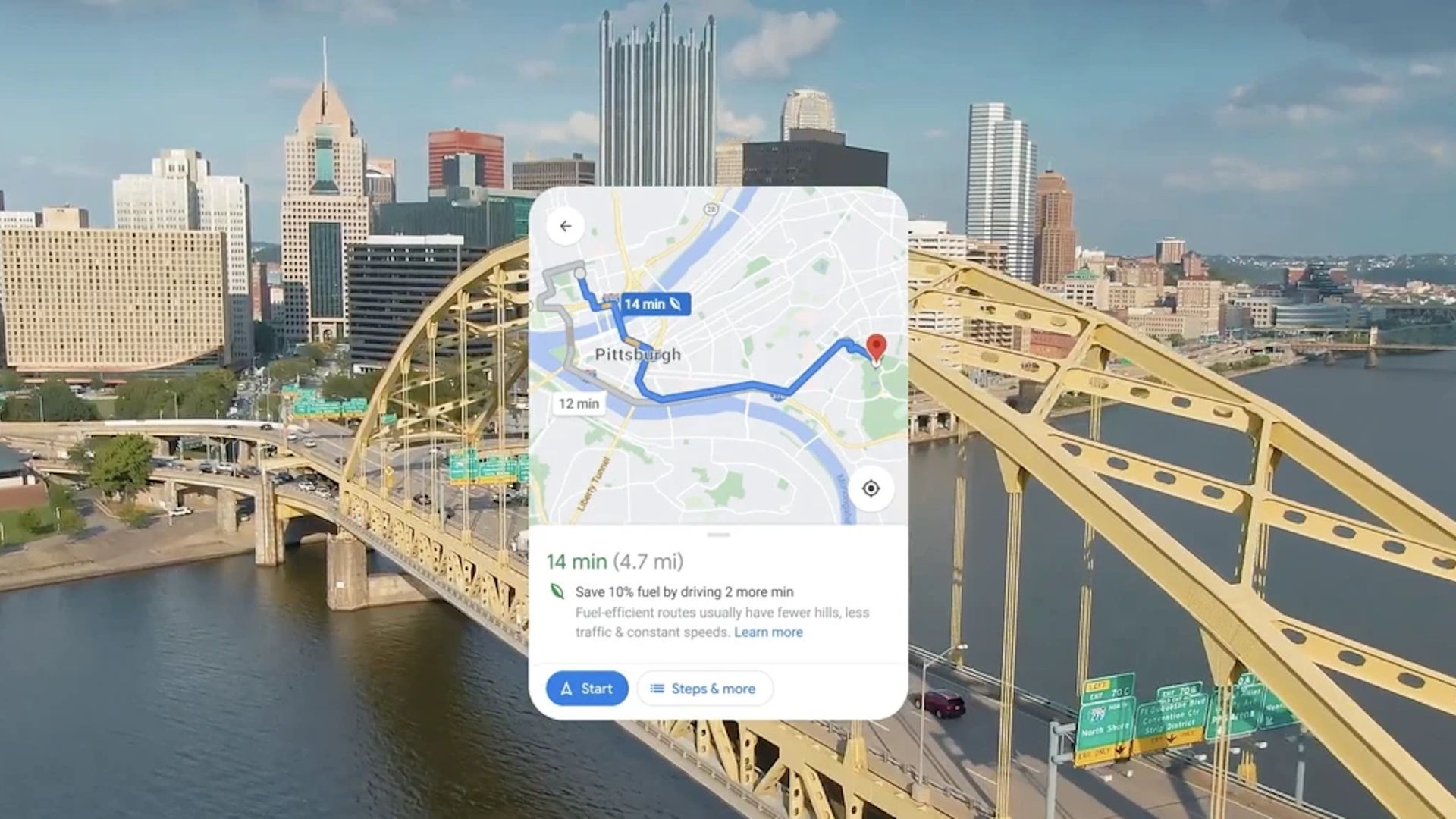Google pushes sustainability, from new eco routes to Nest features

- Andrew Freedman, author ofAxios Generate

Google Maps display with the most efficient routing, set against the backdrop of Pittsburgh. Photo: Google
Google unveiled a suite of sustainability features focused on giving consumers more information so they can choose to cut their greenhouse gas emissions.
Driving the news: The product rollout this morning will immediately be noticeable if you use Google Maps, utilize the company's flight search tools, search for companies to invest in or simply query the search engine about the causes of global warming.
Details: Google aims to enable a "billion sustainable actions" by 2022, said Kate Brandt, Google's chief sustainability officer. Several of the steps go into effect across the U.S. today. These include:
- Showing the most eco-friendly route in Google Maps and defaulting to it when the estimated travel time is comparable to other, more fuel intensive options. This feature was developed in partnership with the Energy Department's National Renewable Energy Laboratory in Colorado.
- The feature uses metrics like road congestion and incline to calculate the route that will burn the least fuel.
- "We believe this feature will have the same impact next year as taking over 200,000 cars off the road," said Sundar Pichai, CEO of Google and Alphabet, in a video presentation.
- Google Flights is surfacing more sustainable choices as well, by starting today, displaying the carbon emissions of various flight options when using the Google Flights search tool. Its metrics are both seat-specific and flight-specific.
- A first or business class seat has a higher greenhouse gas footprint than a coach seat does because it takes up more space.
- The flight search will label flights with a green badge that have much lower emissions than other flights on the same route.
Also in the travel category, the company's hotel search now shows if a hotel has made sustainability commitments and whether they have eco certifications from independent organizations. Hilton and Accor have already started adding this information to their global hotel portfolio, Brandt said in a presentation to the media on Tuesday.
- In addition, beginning this week in the U.S., Google will surface the most cost-effective and sustainable options when you search for energy-intensive appliances, such as furnaces, dishwashers and stoves.
Between the lines: Google is designing new landing pages for when people search for "climate change" and other basic climate science and policy questions. These pages will aim to surface the most reliable information from neutral organizations, such as the United Nations, company officials said.
Yes, but: Ads will still be sold to appear next to these search results, which could still direct users to climate science misinformation from special interest groups. Also, the landing page step is not being applied to Youtube, home of many videos that question the proven findings of mainstream climate science.
State of play: As Google moves towards its goal of becoming a company that runs on 100% carbon-free energy by 2030, it is trying to take its customers along for the journey as well. The early route for this is through its Nest smart thermostats.
How it works: Through a program called "Nest Renew," people with compatible Nest thermostats (a 3rd-generation Nest Learning Thermostat, Nest Thermostat E, or the newest Nest Thermostat) will be able to shift their peak heating and cooling electricity usage to align with times when the electricity grid is cleaner or less expensive.
- A paid version of Nest Renew, to be known as Nest Renew Premium, will cost $10 per month. This program aims to allow users to match their carbon-based electricity use at home with renewable energy credits from U.S. solar and wind plants in Google's energy portfolio, thereby compensating for their greenhouse gas emissions.
The intrigue: Google is also in the midst of testing a project that would use AI to fine tune the traffic lights across an entire city to favor a more efficient traffic flow. Testing has been taking place in Israel, and will soon expand to Rio de Janeiro.
The bottom line: "In all of these efforts, our goal is to make the sustainable choice, an easier choice," Pichai said.